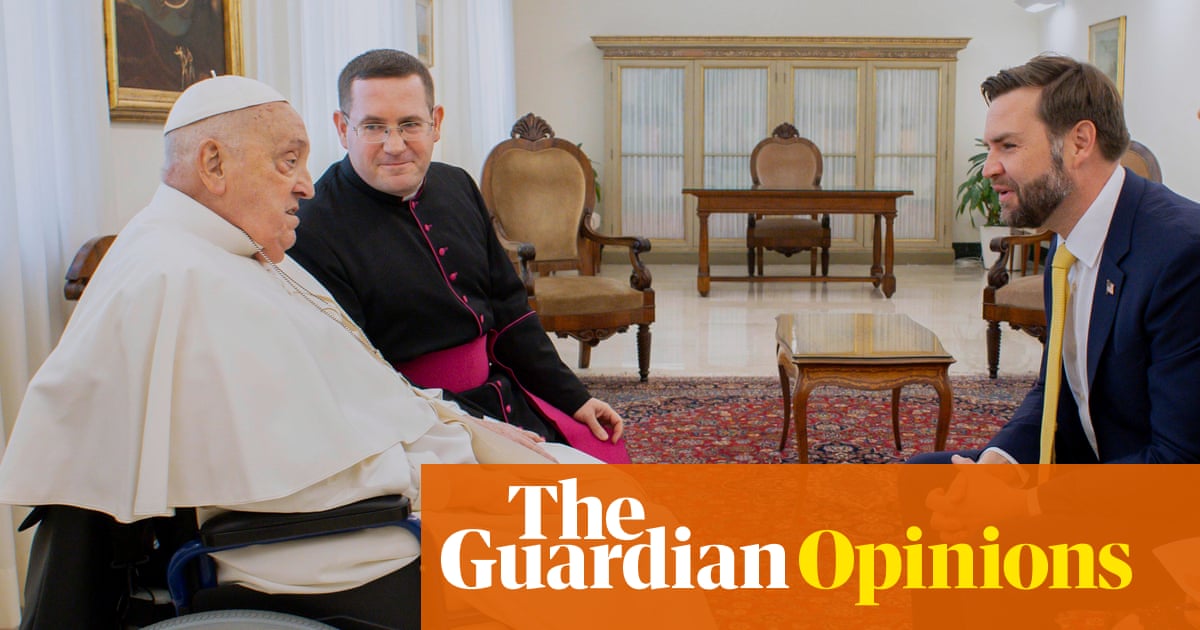We might never quite know what Pope Francis said to the US vice-president during their verybrief meetingon Sunday. In the widely shared video clip, it was hardly audible. The morning after, Francis died, and Vance jetted to visit India, finding time totweetthat his heart went out to the millions of Christians who loved Francis (implying, I suppose, that not all Catholics loved him) and patronizing the dead pontiff by calling one of his homilies “really quite beautiful”).
Francis had been as outspoken as could be without naming names, when he criticized Vance in his February letter to US bishops; but he was not just registeringhis rebukeof Trump and Vance’s cruel treatment of refugees and migrants; he was reacting to a broader trend of instrumentalizing religion for nationalist and authoritarian populism.
In February, Vance had an online “close-quarters street fight” with Rory Stewart, the former UK Conservative minister, diplomat and nowprofessor in the practice of grand strategyat the very university from which Vance obtained his law degree. At issue was what to most of us wouldn’t seem an obvious source of social media outrage: the correct reading of St Augustine’s notion ofordo amoris, the right ordering of love.
In January, Vance had alluded to the concept in aninterview with the Trump courtier Sean Hannity; according to the Catholic convert, it was a “Christian concept” that love and compassion start with family, then extend to neighbors, then nation, and, last and least, reach fellow human beings as such.
Stewart had registered skepticism,observingthat Vance’s stance was “a bizarre take on John 15:12-13 – less Christian and more pagan tribal. We should start worrying when politicians become theologians, assume to speak for Jesus, and tell us in which order to love.” The infamously very online Vance hit back with: “Just google ‘ordo amoris’.” In typically snarky fashion, Vance thenquestioned Stewart’s IQand added that “false arrogance” of the Stewart type “drives so much elite failure over the last 40 years” (never mind what would constitute appropriate or correct arrogance).
As plenty of learned observers remarked at the time, complex theological questions will not have bumper-sticker-size answers. But eventually a figure not entirely irrelevant for Catholics weighed in with a view that perhaps carries indeed more weight than those of others. Francis, in aletter to US bishops, instructed the flock that “Christian love is not a concentric expansion of interests that little by little extend to other persons and groups. In other words: the human person is not a mere individual, relatively expansive, with some philanthropic feelings!”
He added, driving home the rebuke without naming names, that “the trueordo amoristhat must be promoted is that which we discover by meditating constantly on the parable of the ‘Good Samaritan’ … that is, by meditating on the love that builds a fraternity open to all, without exception.” Apparently,Cardinal Pietro Parolin was dispatchedon Saturday to explain all this to Vance again.
Vance is not the only far-right populist who has smuggled nationalism into what he touts as the correct notion of Christianity. Viktor Orbán, a great model for Vance and other self-declared US “post-liberals” (meaning: anti-liberals), has been declaring for years that a proper understanding of “Christian Democracy” is not only “illiberal”, but nationalist.
That would have been news to the many Catholics who experienced nation-building projects in Germany and Italy during the 19th century as outright oppressive. After all, Catholics were suspected of putting loyalty to Rome ahead of civic duties (a suspicion still very much alive in the US when JFK ran for office). Bismarck started theKulturkampf(the original meaning of culture war) against Catholics in the 1870s; the Vatican forbade the faithful to participate in the political life of unified Italy.
Far-right populists claim that only they represent what they call “the real people”. Of course, they have to explain who “the real people” are (and, who by contrast, does not truly belong). Many have instrumentalized Christianity for that purpose. Giorgia Meloni, in herautobiography, states: “The Christian identity can be secular rather than religious.” What matters is not believing (let alone actual Christian conduct), but onlybelonging. It’s what the social scientist Rogers Brubaker has called “Christianism”, in contrast with actual Christianity.
Some far-right populists have tried to square their Catholicism with their populism by criticizing the hierarchy as a somehow illegitimate, or at least hypocritical, elite. Italy’sMatteo Salvini, who likes to flaunt the Bible and a rosary when riling up the masses of “real” Italians, pioneered this move; Vance copied it when he insinuated that there was something corrupt about church leadership; concretely he had accused US bishops of resettling “illegal immigrants” in order to obtain federal funds (an accusation deemed “very nasty” by Cardinal Timothy Dolan).
The point is not that the correct understanding of Catholicism (orChristian Democratic political parties, as they have existed in Europe and Chile) has always been liberal; that’s hardly plausible. The point is that Francis reaffirmed that Catholicism is not compatible with the “America first” (and humanity last) view of the Trumpists.
Jan-Werner Müller is a Guardian US columnist and a professor of politics at Princeton University
